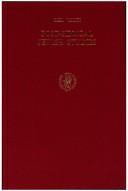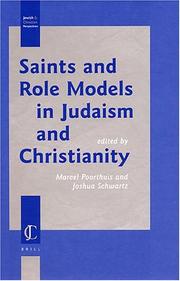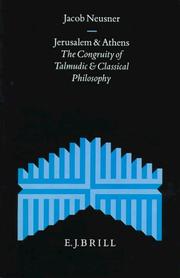| Listing 1 - 10 of 12 | << page >> |
Sort by
|
Book
ISBN: 9783110333824 3110333821 9783110339963 9783110395310 3110395312 311033996X 3110553961 Year: 2014 Publisher: Berlin, Germany De Gruyter
Abstract | Keywords | Export | Availability | Bookmark
 Loading...
Loading...Choose an application
- Reference Manager
- EndNote
- RefWorks (Direct export to RefWorks)
Lament, mourning, and the transmissibility of a tradition in the aftermath of destruction are prominent themes in Jewish thought. The corpus of lament literature, building upon and transforming the biblical Book of Lamentations, provides a unique lens for thinking about the relationships between destruction and renewal, mourning and remembrance, loss and redemption, expression and the inexpressible. This anthology features four texts by Gershom Scholem on lament, translated here for the first time into English. The volume also includes original essays by leading scholars, which interpret Scholem's texts and situate them in relation to other Weimar-era Jewish thinkers, including Walter Benjamin, Franz Rosenzweig, Franz Kafka, and Paul Celan, who drew on the textual traditions of lament to respond to the destruction and upheavals of the early twentieth century. Also included are studies on the textual tradition of lament in Judaism, from biblical, rabbinic, and medieval lamentations to contemporary Yemenite women's laments. This collection, unified by its strong thematic focus on lament, shows the fruitfulness of studying contemporary and modern texts alongside the traditional textual sources that informed them.
Laments --- Jewish mourning customs --- Jewish philosophy. --- Laments in the Bible. --- 296*6 --- Jews --- Philosophy, Jewish --- Philosophy, Israeli --- Mourning customs, Jewish --- Mourning (Jewish law) --- Mourning customs --- Complancha --- Lamentations --- Elegiac poetry --- 296*6 Joodse theologie en filosofie--(algemeen) --- Joodse theologie en filosofie--(algemeen) --- Philosophy. --- Philosophy --- Bible. --- Criticism, interpretation, etc. --- Jewish philosophy --- Laments in the Bible --- Gershom Scholem. --- Jewish Thought. --- Lament. --- Mourning.
Book
ISBN: 9781400865789 1400865786 9780691149479 069114947X 0691176272 1336195991 9780691176277 Year: 2015 Publisher: Princeton, NJ : Princeton University Press,
Abstract | Keywords | Export | Availability | Bookmark
 Loading...
Loading...Choose an application
- Reference Manager
- EndNote
- RefWorks (Direct export to RefWorks)
This book explores one of the great questions of our time: How can we preserve our sense of what it means to be a person while at the same time accepting what science tells us to be true-namely, that human nature is continuous with the rest of nature? What, in other words, does it mean to be a person in a world of things? Alan Mittleman shows how the Jewish tradition provides rich ways of understanding human nature and personhood that preserve human dignity and distinction in a world of neuroscience, evolutionary biology, biotechnology, and pervasive scientism. These ancient resources can speak to Jewish, non-Jewish, and secular readers alike.Science may tell us what we are, Mittleman says, but it cannot tell us who we are, how we should live, or why we matter. Traditional Jewish thought, in open-minded dialogue with contemporary scientific perspectives, can help us answer these questions. Mittleman shows how, using sources ranging across the Jewish tradition, from the Hebrew Bible and the Talmud to more than a millennium of Jewish philosophy. Among the many subjects the book addresses are sexuality, birth and death, violence and evil, moral agency, and politics and economics. Throughout, Mittleman demonstrates how Jewish tradition brings new perspectives to-and challenges many current assumptions about-these central aspects of human nature.A study of human nature in Jewish thought and an original contribution to Jewish philosophy, this is a book for anyone interested in what it means to be human in a scientific age.
Respect for persons (Jewish law) --- Judaism --- Theological anthropology --- Philosophical anthropology. --- 296*6 --- Anthropology, Philosophical --- Man (Philosophy) --- Civilization --- Life --- Ontology --- Humanism --- Persons --- Philosophy of mind --- Man (Jewish theology) --- Jewish theology --- Theology, Jewish --- Jewish law --- 296*6 Joodse theologie en filosofie--(algemeen) --- Joodse theologie en filosofie--(algemeen) --- Doctrines. --- Judaism. --- Philosophy --- Philosophical anthropology --- Doctrines
Book
ISBN: 9780691149745 0691149747 0691181160 1400880467 Year: 2016 Publisher: Princeton, N.J. Princeton University Press
Abstract | Keywords | Export | Availability | Bookmark
 Loading...
Loading...Choose an application
- Reference Manager
- EndNote
- RefWorks (Direct export to RefWorks)
Death --- Jewish mourning customs. --- 296*6 --- Mourning customs, Jewish --- Mourning (Jewish law) --- Mourning customs --- 296*6 Joodse theologie en filosofie--(algemeen) --- Joodse theologie en filosofie--(algemeen) --- Religious aspects --- Judaism. --- Jewish religion --- Ethnology. Cultural anthropology --- Judaism --- social anthropology --- mourning --- Jewish mourning customs --- Dying --- End of life --- Life --- Terminal care --- Terminally ill --- Thanatology --- Religious aspects&delete& --- Philosophy
Book
ISBN: 9781618118387 1618118382 9781644691373 164469137X Year: 2019 Publisher: Boston, MA : Academic Studies Press,
Abstract | Keywords | Export | Availability | Bookmark
 Loading...
Loading...Choose an application
- Reference Manager
- EndNote
- RefWorks (Direct export to RefWorks)
That the God of the Hebrew Bible and rabbinic literature, "the God of the Jews," is perfectly good is challenged by apparently immoral acts of that God, by contemporary standards, as well as by the classic problem of evil. In this book, Jerome Gellman aims to alleviate the first challenge, the so-called ideological critique, for the traditional believer by recommending replacing the God of the Jews with a different God, a "Jewish God," one in whom many traditional Jews have come to believe. And the problem of evil is lightened for the traditional believer, mainly by a possible theodicy explaining much evil. The book is at once analytic in style and Hasidic in broad orientation.
God (Judaism) --- Orthodox Judaism --- 296*6 --- Jewish sects --- Ex-Orthodox Jews --- Judaism --- 296*6 Joodse theologie en filosofie--(algemeen) --- Joodse theologie en filosofie--(algemeen) --- Doctrines --- Doctrines. --- Critique of post-modernism. --- God. --- Hasidic Judaism. --- Hasidic thought. --- Hasidism. --- Jewish theology. --- Judaism. --- Old Testament. --- apologetics. --- belief. --- epistemology. --- evil. --- humility response. --- modern religious life. --- morality. --- perfect goodness. --- philosophy. --- possible theodicy. --- religious philosophy. --- theology. --- truth.
Book
ISBN: 0521427223 Year: 1997 Volume: 6 Publisher: Cambridge : Cambridge university press,
Abstract | Keywords | Export | Availability | Bookmark
 Loading...
Loading...Choose an application
- Reference Manager
- EndNote
- RefWorks (Direct export to RefWorks)
Bien et mal (Judaïsme) --- Filosofie [Joodse ] --- Goed en kwaad (Jodendom) --- Good and evil (Judaism) --- Jewish philosophy --- Joodse filosofie --- Philosophie juive --- Philosophy [Jewish ] --- 216 --- 296*6 --- Judaism --- -Philosophy, Jewish --- Suffering --- -Affliction --- Masochism --- Pain --- Jews --- Philosophy, Jewish --- Philosophy, Israeli --- Religions --- Semites --- Goed en kwaad --- Joodse theologie en filosofie--(algemeen) --- Doctrines --- Religious aspects --- -Judaism --- Philosophy --- Religion --- -Goed en kwaad --- 296*6 Joodse theologie en filosofie--(algemeen) --- -Jews --- Affliction --- Bible. Job --- Criticism, interpretation, etc. [Jewish ] --- -Doctrines

ISBN: 9004041605 9789004041608 9004670467 9789004670464 Year: 1975 Volume: v. 8 Publisher: Leiden ;Boston Brill
Abstract | Keywords | Export | Availability | Bookmark
 Loading...
Loading...Choose an application
- Reference Manager
- EndNote
- RefWorks (Direct export to RefWorks)
Qumran community --- Essenes --- Rabbinical literature --- Communauté de Qumran --- Esséniens --- Littérature rabbinique --- History and criticism --- Histoire et critique --- Bible. --- Criticism, interpretation, etc. --- Bible --- Criticism, interpretation, etc --- 296*6 --- -Hebrew literature --- Jewish literature --- Kumran community --- Jewish sects --- Joodse theologie en filosofie--(algemeen) --- Qumran community. --- Essenes. --- History and criticism. --- -Joodse theologie en filosofie--(algemeen) --- 296*6 Joodse theologie en filosofie--(algemeen) --- -Kumran community --- Communauté de Qumrān --- Esséniens --- Littérature rabbinique

ISBN: 9004126147 9786610466856 1423710967 1280466855 9047401603 9789004126145 9781423710967 9789047401605 9781280466854 6610466858 Year: 2004 Volume: 7 Publisher: Leiden ; Boston : Brill,
Abstract | Keywords | Export | Availability | Bookmark
 Loading...
Loading...Choose an application
- Reference Manager
- EndNote
- RefWorks (Direct export to RefWorks)
This volume deals with the role of saints and exemplary individuals in Judaism and Christianity. Although sharing the Hebrew Bible and recognizing the same Biblical figures there, both religions have developed widely divergent perspectives upon the significance of these figures, although there are occasional common motifs and themes. Moreover, even the contrasting themes betray an underlying interaction between both religions as is clear from the contributions on, for example, Melchizedek, Elijah, the Desert Fathers, Rabbis on clothing, the Apostle Peter in Jewish tradition, the Maccabees in Christian tradition and the Biblical examples in Saint Antony the Hermit. The book examines Jewish and Christian perspectives upon saints and role models from the Biblical period to the present time. It will be of special importance to scholars and general readers interested in an interdisciplinary approach to theology, rabbinics, history, art history and much more.
Zaddikim --- Christian saints --- Holiness --- Christianity and other religions --- Judaism --- Christianity --- Relations --- 296*6 --- 235.3 --- 296*6 Joodse theologie en filosofie--(algemeen) --- Joodse theologie en filosofie--(algemeen) --- Hagiografie --- Jewish saints --- Tsadikim --- Tzaddikim --- Zadikim --- Hasidism --- Saints --- Jews --- Religions --- Semites --- Holy, The --- Perfection --- Righteousness --- Sanctification --- Canonization --- Relations&delete& --- Religion --- Religious aspects --- Congresses --- Hasidim --- Brotherhood Week --- Zaddikim - Congresses --- Christian saints - Congresses --- Holiness - Judaism - Congresses --- Holiness - Christianity - Congresses --- Christianity and other religions - Judaism --- Judaism - Relations - Christianity --- Judaism. --- Christianity.

ISBN: 9004106987 9004497978 9789004106987 9789004497979 Year: 1997 Volume: 52 Publisher: Leiden;Boston BRILL
Abstract | Keywords | Export | Availability | Bookmark
 Loading...
Loading...Choose an application
- Reference Manager
- EndNote
- RefWorks (Direct export to RefWorks)
The Talmud - the Mishnah, a philosophical law code, and the Gemara, a dialectical commentary upon the Mishnah - works by translating principal modes of Western philosophy and science into the analysis of the rules of rationality governing the rules of humble, everyday reality. Science, in particular the method of hierarchical classification characteristic of natural history, supplies the method of making connections and drawing conclusions to the Mishnah, the law-code that forms the foundation-document of the Talmud, as Neusner demonstrated in his Judaism as Philosophy. The Method and Message of the Mishnah. Here he proceeds to show how philosophy, specifically dialectical analysis, defines the logic of the Gemara and guides the writers of the Gemara's compositions and the compilers of its composites in their analysis and amplification of some of the topical presentations, or tractates, of the Mishnah.
Jewish law --- Interpretation and construction --- 296*6 --- -Biblical law --- Civil law (Jewish law) --- Halacha --- Halakha --- Halakhah --- Hebrew law --- Jews --- Law, Hebrew --- Law, Jewish --- Law, Mosaic --- Law in the Bible --- Mosaic law --- Torah law --- Law, Semitic --- Commandments (Judaism) --- Joodse theologie en filosofie--(algemeen) --- Law --- -Joodse theologie en filosofie--(algemeen) --- 296*6 Joodse theologie en filosofie--(algemeen) --- Talmud --- Talmud Bavli --- Babylonian Talmud --- Talmud, Babylonian --- Talmud Vavilonskiĭ --- Talmoed, Babylonische --- Babylonische Talmoed --- Shas --- Shishah sedarim --- Talmud of Babylonia --- Talmud de Babilonia --- Talmud Babli --- Talmouth --- Talmod --- Philosophy. --- Philosophy --- Interpretation --- Philosophy [Jewish ] --- Classical philosophy --- Athens (Greece) --- Jerusalem (Israel)

ISBN: 9004116869 9004498095 Year: 2002 Volume: 69 Publisher: Leiden Boston Brill
Abstract | Keywords | Export | Availability | Bookmark
 Loading...
Loading...Choose an application
- Reference Manager
- EndNote
- RefWorks (Direct export to RefWorks)
Jewish magic --- Joodse magie --- Magic [Jewish ] --- Magie [Joodse ] --- Magie juive --- 296*6 --- Magic, Jewish --- Philosophy, Jewish --- Rabbinical literature --- -Hebrew literature --- Jewish literature --- Jews --- Philosophy, Israeli --- Magic, Semitic --- Joodse theologie en filosofie--(algemeen) --- History and criticism --- Philosophy --- -Joodse theologie en filosofie--(algemeen) --- 296*6 Joodse theologie en filosofie--(algemeen) --- -Jews --- Jewish philosophy --- Bible. --- Antico Testamento --- Hebrew Bible --- Hebrew Scriptures --- Kitve-ḳodesh --- Miḳra --- Old Testament --- Palaia Diathēkē --- Pentateuch, Prophets, and Hagiographa --- Sean-Tiomna --- Stary Testament --- Tanakh --- Tawrāt --- Torah, Neviʼim, Ketuvim --- Torah, Neviʼim u-Khetuvim --- Velho Testamento --- Criticism, interpretation, etc., Jewish. --- Hermeneutics --- Religious aspects --- Judaism
Book
ISBN: 1282069837 9786612069833 0226251748 9780226251745 9780226251714 0226251713 9780226251721 9781282069831 661206983X Year: 2008 Publisher: Chicago : University of Chicago Press,
Abstract | Keywords | Export | Availability | Bookmark
 Loading...
Loading...Choose an application
- Reference Manager
- EndNote
- RefWorks (Direct export to RefWorks)
Contemporary theology, and Jewish theology in particular, Michael Fishbane asserts, now lies fallow, beset by strong critiques from within and without. For Jewish reality, a coherent and wide-ranging response in thoroughly modern terms is needed. Sacred Attunement is Fishbane's attempt to renew Jewish theology for our time, in the larger context of modern and postmodern challenges to theology and theological thought in the broadest sense. The first part of the book regrounds theology in this setting and opens up new pathways through nature, art, and the theological dimension as a whole. In the second section, Fishbane introduces his hermeneutical theology-one grounded in the interpretation of scripture as a distinctly Jewish practice. The third section focuses on modes of self-cultivation for awakening and sustaining a covenant theology. The final section takes up questions of scripture, authority, belief, despair, and obligation as theological topics in their own right. The first full-scale Jewish theology in America since Abraham J. Heschel's God in Search of Man and the first comprehensive Jewish philosophical theology since Franz Rosenzweig's Star of Redemption, Sacred Attunement is a work of uncommon personal integrity and originality from one of the most distinguished scholars of Judaica in our time.
Judaism --- Spiritual life --- Hermeneutics --- Jewish theology --- Theology, Jewish --- Doctrines. --- Judaism. --- Religious aspects --- 296*6 --- Interpretation, Methodology of --- Criticism --- 296*6 Joodse theologie en filosofie--(algemeen) --- Joodse theologie en filosofie--(algemeen) --- Religious aspects&delete& --- Doctrines --- Judaism - Doctrines. --- Spiritual life - Judaism. --- Hermeneutics - Religious aspects - Judaism. --- judaism, theology, jewish, religion, spirituality, scripture, obligation, despair, belief, authority, nature, art, hermeneutics, interpretation, faith, devotion, piety, orthodoxy, obedience, self-cultivation, awakening, spiritual growth, philosophy, attention, prayer, study, kindness, mitzvah, torah, sinai, halakha, futility, infinity, finitude, hiyyuv, hevel, integrity, emunah, nonfiction, worship.
| Listing 1 - 10 of 12 | << page >> |
Sort by
|

 Search
Search Feedback
Feedback About UniCat
About UniCat  Help
Help News
News